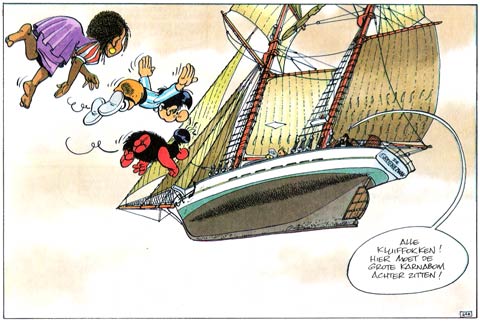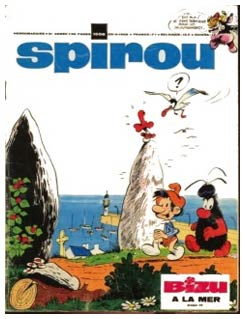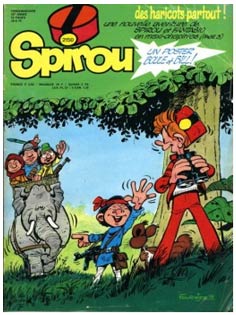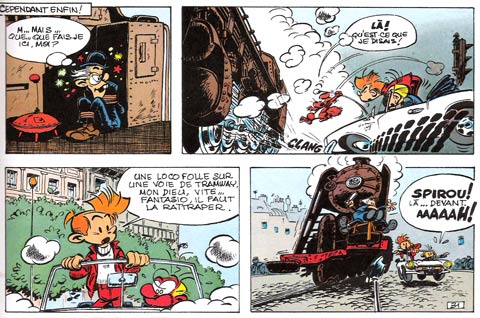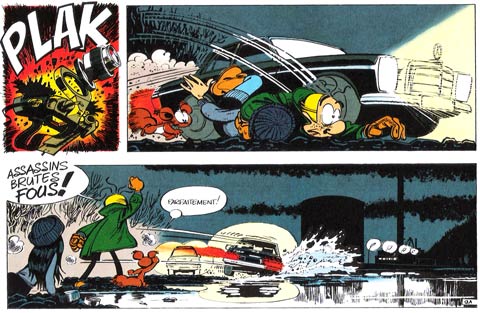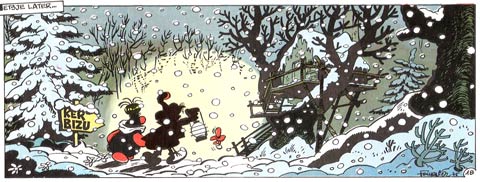'Bizu' #3 (1992). Dutch-language version.
Born in Paris into a family of Breton origins, Jean-Claude Fournier was raised in the seaport Saint-Quay Portrieux. He attended art classes at the Lycée Henri Avril in Lamballe and then at the Lycée Claude Bernard in Paris. He initially aspired a career in the theater, but he was encouraged to focus on drawing after presenting his work to André Franquin. Fournier found his way to the publishing house Dupuis and its magazine Spirou in 1967. His first series was 'Bizu', a poetic fairy tale comic set in the forest of Brocéliande, in which Fournier's origins were evident.
Covers for Spirou #1558 and 2150.
However, after two years, Fournier was asked to succeed Franquin as the author of the magazine's leading series, 'Spirou et Fantasio'. He introduced new characters, such as the mysterious crime cartel The Triangle, the Japanese magicien Itoh Kata and the charming Polynesian girl Ororéa. He also incorporated humanitarian, political and Breton elements to the series, most notably in his 1977 album 'L'Ankou', the first and only 'Spirou' album to appear in Breton language. Ankou, a character originating from Breton folktales who embodies death, became the mascot of the protests against the construction of a nuclear power plant in Brittany in the late 1970s.
Spirou #21 - 'Glucose Pour Noémie'.
The 1974 'Spirou' album 'Le Gri-Gri du Niokolo-Koba', a story set in Senegal, earned Fournier a large fanbase in Africa. Following the success, Fournier has frequently visited the continent, organizing comic courses and internships and participating in festivals in Ivory Coast and Cameroon. Due to a disagreement with the publisher, Fournier abandoned 'Spirou et Fantasio' in 1981. He has created 9 albums of this classic series, and still draws the character for his fans during signing sessions and festivals.
Spirou - 'L'Ankou'.
In the 1980s, Fournier returned to his original character, 'Bizu'. He made two new albums for the publishing house Fleurus in 1986, but he returned to Spirou magazine in 1989. Four long stories followed, published in Spirou and then in albums by Dupuis until 1994.
Bizu - 'La Nuit du Po' (Spirou #1966, 1975).
Fournier subsequently teamed up with scriptwriter Zidrou to create a gag series about a family of cannibals, 'Les Crannibales'. Using a more loose and comical style than in his previous comics, Fournier worked on this series until 2005. Eight albums were published, all with a "bite" out of the cover as a gimmick.
'Les Crannibales' #8.
Between 1972 and 1986, Fournier was additionally an illustrator and cartoonist for the newspaper Ouest-France. He has done commercial assignments for Citroën, Maisons Phenix and Nestlé. In his studio in Rennes, Fournier has trained several Breton artists, such as Malo Louarn, Albert Blesteau, Jean-Luc Hiettre, Gégé, Emmanuel Lepage, Lucien Rollin and Michel Plessix. He is regularly asked to give workshops at schools, because of his knowledge of the profession and for his capability of quickly making large drawings in public. He is co-founder of Quai des Bulles, the big comic festival in Saint-Malo, first organized in 1992.
'Bizu'.
Although already at an advanced age, Fournier trained himself to drawing in a realistic style, which resulted in the album 'Les Chevaux du Vents'. Written by his friend Christian Lax, the first volume was published in the Aire Libre collection of Éditions Dupuis in 2008, the second in 2012. Jean-Claude Fournier was invested with a knighthood in the French Ordre des Arts et des Lettres in 2014.
In 1990, Fournier paid graphic tribute to François Walthéry in the collective homage book 'Natacha. Special 20 Ans' (Marsu Productions, 1990), which celebrated the 20th anniversary of Walthéry's series 'Natacha'. He also paid tribute to Nikita Mandryka in the collective comic book 'Tronches de Concombre' (Dupuis, 1995). In Spirou issue #3778 (8 September 2010), Fournier drew a special homage to André Geerts, who'd recently passed away.
'Les Chevaux du Vents'.



